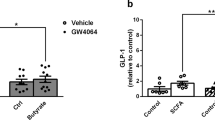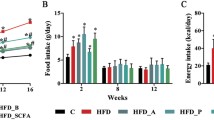Abstract
Background and objective
Omega-3 fatty acids, such as α-linolenic acid (ALA), eicosapentaenoic acid (EPA), and docosahexaenoic acid (DHA), are polyunsaturated fatty acids (PUFA) that have long been associated with anti-inflammatory activity and general benefit toward human health. Over the last decade, the identification of a family of cell-surface G protein-coupled receptors that bind and are activated by free-fatty acids, including omega-3 fatty acids, suggest that many effects of PUFA are receptor-mediated. One such receptor, free-fatty acid receptor-4 (FFAR4), previously described as GPR120, has been shown to modulate anti-inflammatory and insulin-sensitizing effects in response to PUFA such as ALA and DHA. Additionally, FFAR4 stimulates secretion of the insulin secretagogue glucagon-like peptide-1 (GLP-1) from the GI tract and acts as a dietary sensor to regulate energy availability. The aim of the current study was to assess the effects of dietary omega-3 fatty acid supplementation on FFAR4 expression in the rat colon.
Methods
Sprague–Dawley rats were fed control soybean oil diets or alternatively, diets supplemented with either fish oil, which is enriched in DHA and EPA, or flaxseed oil, which is enriched in ALA, for 7 weeks. GLP-1 and blood glucose levels were monitored weekly and at the end of the study period, expression of FFAR4 and the inflammatory marker TNF-α was assessed.
Results
Our findings indicate that GLP-1 and blood glucose levels were unaffected by omega-3 fatty acid supplementation, however, animals that were fed fish or flaxseed oil-supplemented diets had significantly heightened colonic FFAR4 and actin expression, and reduced expression of the pro-inflammatory cytokine TNF-α compared to animals fed control diets.
Conclusions
These results suggest that similar to ingestion of other fats, dietary-intake of omega-3 fatty acids can alter FFAR4 expression within the colon.



Similar content being viewed by others
References
Yates CM, Calder PC, Ed Rainger G. Pharmacology and therapeutics of omega-3 polyunsaturated fatty acids in chronic inflammatory disease. Pharmacol Ther. 2014;141:272–82.
Hokari R, Matsunaga H, Miura S. Effect of dietary fat on intestinal inflammatory diseases. J Gastroenterol Hepatol. 2013;S4:33–6.
Cabré E, Mañosa M, Gassull MA. Omega-3 fatty acids and inflammatory bowel diseases—a systematic review. Br J Nutr. 2012;107:240–52.
Kantha SS. Dietary effects of fish oils on human health: a review of recent studies. Yale J Biol Med. 1987;60:37–44.
Hawkey CJ, Mahida YR, Hawthorne AB. Therapeutic interventions in gastrointestinal disease based on an understanding of inflammatory mediators. Agents Actions. (1992) C22–6.
Brown AJ, Jupe S, Briscoe CP. A family of fatty acid binding receptors. DNA Cell Biol. 2005;24:54–61.
Hirasawa A, Tsumaya K, Awaji T, Katsuma S, Adachi T, Yamada M, Sugimoto Y, Miyazaki S, Tsujimoto G. Free fatty acids regulate gut incretin glucagon-like peptide-1 secretion through GPR120. Nat Med. 2005;11:90–4.
Oh DY, Talukdar S, Bae EJ, Imamura T, Morinaga H, Fan W, Li P, Lu WJ, Watkins SM, Olefsky JM. GPR120 is an omega-3 fatty acid receptor mediating potent anti-inflammatory and insulin-sensitizing effects. Cell. 2010;142:687–98.
Burns RN, Moniri NH. Agonism with the omega-3 fatty acids alpha-linolenic acid and docosahexaenoic acid mediates phosphorylation of both the short and long isoforms of the human GPR120 receptor. Biochem Biophys Res Commun. 2010;396:1030–5.
Ichimura A, Hirasawa A, Poulain-Godefroy O, Bonnefond A, Hara T, et al. Dysfunction of lipid sensor GPR120 leads to obesity in both mouse and human. Nature. 2012;483:350–4.
Gotoh C, Hong YH, Iga T, Hishikawa D, Suzuki Y, Song SH, Choi KC, Adachi T, Hirasawa A, Tsujimoto G, Sasaki S, Roh SG. The regulation of adipogenesis through GPR120. Biochem Biophys Res Commun. 2007;9:591–7.
Enos RT, Velázquez KT, McClellan JL, Cranford TL, Walla MD, Murphy EA. Reducing the dietary omega-6:omega-3 utilizing α-linolenic acid; not a sufficient therapy for attenuating high-fat-diet-induced obesity development nor related detrimental metabolic and adipose tissue inflammatory outcomes. PLoS One. 2014;14:e94897.
Paulsen SJ, Larsen LK, Hansen G, Chelur S, Larsen PJ, Vrang N. Expression of the fatty acid receptor GPR120 in the gut of diet-induced-obese rats and its role in GLP-1 secretion. PLoS One. 2014;10:e88227.
Cornall LM, Mathai ML, Hryciw DH, McAinch AJ. Diet-induced obesity up-regulates the abundance of GPR43 and GPR120 in a tissue specific manner. Cell Physiol Biochem. 2011;28:949–58.
Reeves PG, Nielsen FH, Fahey GC. AIN-93 purified diets for laboratory rodents: final report of the American Institute of Nutrition ad hoc writing committee on the reformulation of the AIN-76A rodent diet. J Nutr. 1993;123:1939–51.
Kris-Etherton PM, Taylor DS, Yu-Poth S, Huth P, Moriarty K, Fishell V, et al. Polyunsaturated fatty acids in the food chain in the United States. Am J Clin Nutr. 2000;71:179S–88S.
Burns RN, Singh M, Senatorov IS, Moniri NH. Mechanisms of homologous and heterologous phosphorylation of FFA receptor 4 (GPR120): GRK6 and PKC mediate phosphorylation of Thr347, Ser350, and Ser357 in the C-terminal tail. Biochem Pharmacol. 2014;87:650–9.
Tanaka T, Yano T, Adachi T, Koshimizu TA, Hirasawa A, Tsujimoto G. Cloning and characterization of the rat free fatty acid receptor GPR120: in vivo effect of the natural ligand on GLP-1 secretion and proliferation of pancreatic beta cells. Naunyn Schmiedebergs Arch Pharmacol. 2008;377:515–22.
Xiong Y, Swaminath G, Cao Q, Yang L, Guo Q, Salomonis H, et al. Activation of FFA1 mediates GLP-1 secretion in mice. Evidence for allosterism at FFA1. Mol Cell Endocrinol. 2013;369:119–29.
Widmayer P, Goldschmid H, Henkel H, Küper M, Königsrainer A, Breer H. High-fat feeding affects the number of GPR120 cells and enteroendocrine cells in the mouse stomach. Front Physiol. 2015;6(53):1–6.
Duca FA, Swartz TD, Sakar Y, Covasa M. Decreased intestinal nutrient response in diet-induced obese rats: role of gut peptides and nutrient receptors. Int J Obes (Lond). 2013;37:375–81.
Lim GE, Xu M, Sun J, Jin T, Brubaker PL. The Rho guanosine 5′-triphosphatase, cell division cycle 42, is required for insulin-induced actin remodeling and glucogan-like peptide-1 secretion in the intestinal endocrine L cell. Endocrinology. 2009;150:5249–61.
Yan Y, Jiang W, Spinetti T, Tardivel A, Castillo R, Bourquin C, Guarda G, Tian Z, Tschopp J, Zhou R. Omega-3 fatty acids prevent inflammation and metabolic disorder through inhibition of NLRP3 inflammasome activation. Immunity. 2013;38:1154–63.
Mobraten K, Haug TM, Kleiveland CR, Lea T. Omega-3 and omega-6 PUFAs induce the same GPR120-mediated signalling events, but with different kinetics and intensity in Caco-2 cells. Lipids Health Dis. 2013;12:101.
Li X, Yu Y, Funk CD. Cyclooxygenase-2 induction in macrophages is modulated by docosahexaenoic acid via interactions with free fatty acid receptor 4 (FFA4). FASEB J. 2013;27:4987–97.
Liu Y, Chen LY, Sokolowska M, Eberlein M, Alsaaty S, Martinez-Anton A, Logun C, Qi HY, Shelhamer JH. The fish oil ingredient, docosahexaenoic acid, activates cytosolic phospholipase A2 via GPR120 receptor to produce prostaglandin E2 and plays an anti-inflammatory role in macrophages. Immunology. 2014;143:81–95.
Wellhauser L, Belsham DD. Activation of the omega-3 fatty acid receptor GPR120 mediates anti-inflammatory actions in immortalized hypothalamic neurons. J Neuroinflammation. 2014;11:60.
Tsukahara T, Watanabe K, Watanabe T, Yamagami H, Sogawa M, Tanigawa T, et al. Tumor necrosis factor α decreases glucagon-like peptide-2 expression by up-regulating G-protein-coupled receptor 120 in Crohn disease. Am J Pathol. 2015;185:185–96.
Acknowledgments
This work was supported fully or in part by the National Institutes of Health, National Institute of Diabetes and Digestive and Kidney Diseases Grant [DK098730] to N.H.M and a Diabetes Action Research and Educational Foundation grant to N.H.M. The authors wish to thank Mrs. Vivienne Brown for secretarial support.
Author information
Authors and Affiliations
Corresponding author
Additional information
Responsible Editor: John Di Battista.
A. Cheshmehkani, I. S. Senatorov contributed equally to this work.
Rights and permissions
About this article
Cite this article
Cheshmehkani, A., Senatorov, I.S., Kandi, P. et al. Fish oil and flax seed oil supplemented diets increase FFAR4 expression in the rat colon. Inflamm. Res. 64, 809–815 (2015). https://doi.org/10.1007/s00011-015-0864-3
Received:
Revised:
Accepted:
Published:
Issue Date:
DOI: https://doi.org/10.1007/s00011-015-0864-3




